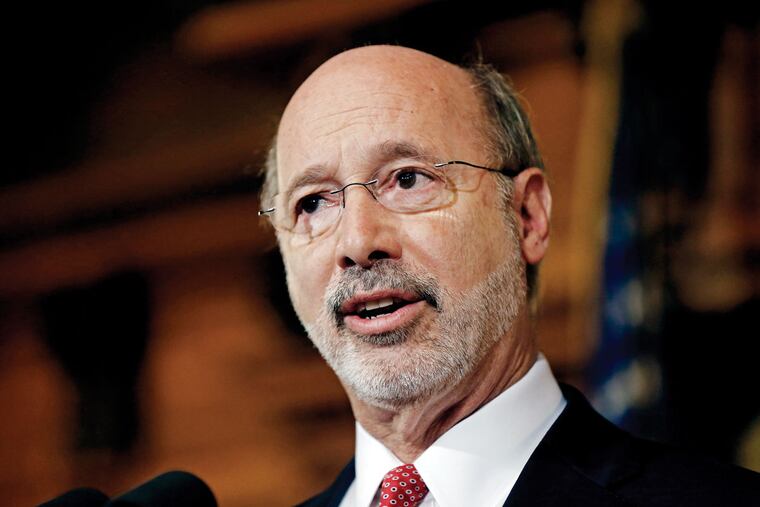New year brings no hint of Pa. budget breakthrough
HARRISBURG - New year, same old issues. Boosting education funding. Changing the state's pension systems. Reforming how liquor is sold. Modifying taxes on homeowners and natural gas drillers.

HARRISBURG - New year, same old issues.
Boosting education funding. Changing the state's pension systems. Reforming how liquor is sold. Modifying taxes on homeowners and natural gas drillers.
Each of those big-ticket items was, at some point during Gov. Wolf's first year in office, part of an ambitious budget discussion that he and the Republican-led legislature hoped could transform Pennsylvania.
But after six months of back-and-forth negotiations - and, often, gridlock - all of those issues remain unresolved.
Wolf's line-item veto Tuesday of a more modest GOP budget proposal than he wanted left no obvious path for lawmakers to approve a full spending bill at the start of 2016 - let alone tackle peripheral legislative priorities that have lingered in the Capitol for years.
"It's hard to have a lot of confidence, given the trench warfare that we've seen through much of the fall," said Christopher Borick, a political scientist at Muhlenberg College.
That trench warfare forced school districts to borrow $900 million to stay open, nonprofits to stop paying for basic utilities or staff, and county governments to hold back payments to the state.
The infusion of cash from Wolf's partial veto should help: about $2.5 billion in basic education funds will be released, and more than $9 billion for human services.
But those figures are just a portion of the typical annual allocations. Wolf, a Democrat still fighting for his biggest policy victory as governor, hopes the half-baked budget will help push forward continued negotiations on a full-year plan.
Jay Himes, executive director of the Pennsylvania Association of School Business Officials, said the partial budget approval simply puts school districts back on the clock, waiting to see how long they have until their coffers again run dry.
"We can't get to June and still be talking about" an incomplete budget, he said. "Districts won't make it that far."
Himes estimated that schools on the brink in December might be able to remain open for an additional 60 days. The lion's share of local property-tax revenue is collected in the fall, and most districts already have burned through that cash - and more.
"We're going to be right back in this same situation, with districts going through this hand-wringing process . . . in a much shorter period of time," he said.
Lawrence Feinberg, a longtime school board member in Haverford Township, Delaware County, noted that most districts soon have to start budget planning for the next school year - even though they have little to no idea how much they'll receive for this year.
"This only injects more uncertainty into planning and budgeting for the future," he said.
Wolf, for his part, has laid the blame squarely on legislative Republicans.
Along with House and Senate leaders, the governor before Thanksgiving announced a tentative $30.8 billion budget agreement that would have given Wolf the $350 million boost he wanted for schools while enacting changes to the state's pension and liquor systems - both long-held Republican priorities.
But the so-called framework derailed in December as the House and Senate battled over taxes and pensions, then hastily approved a smaller budget plan before breaking for Christmas.
House Majority Leader Dave Reed (R., Indiana) said last week that the peripheral items in the agreement may have clouded negotiations - and that some framework elements, such as liquor privatization, seemed to fall by the wayside as talks progressed.
"The only thing left in that original framework is higher taxes and more spending," he said, citing the two issues that most rile his caucus.
Still, Senate Majority Leader Jake Corman (R., Centre) continued to insist last week that any full-year budget needs to be accompanied by pension-reform legislation if it is to have a shot at clearing his chamber.
Wolf, in a brief but fiery news conference Tuesday, said he still wants to sign into law a budget that includes a $350 million increase for schools. He did not have another public appearance all week, but continued firing salvos in the public relations war, striving to justify his veto by arguing that the pared-down GOP plan underfunded schools and wouldn't balance.
Despite the governor's call that they return to the Capitol, House and Senate members disappeared from view after the veto. Neither chamber had future session days scheduled, though the House is due to return for a nonvoting session Tuesday, said House Democrats spokesman Bill Patton.
How and when lawmakers begin resolving their differences in 2016 - and just how many differences they seek to resolve - remain something of a mystery.
"I think there was a bit of optimism [last year], maybe they find a way to forge a grand compromise," said Borick, the political analyst. "Ultimately, that didn't materialize."
609-217-8305@cs_palmer
Staff writer Caitlin McCabe contributed to this article.